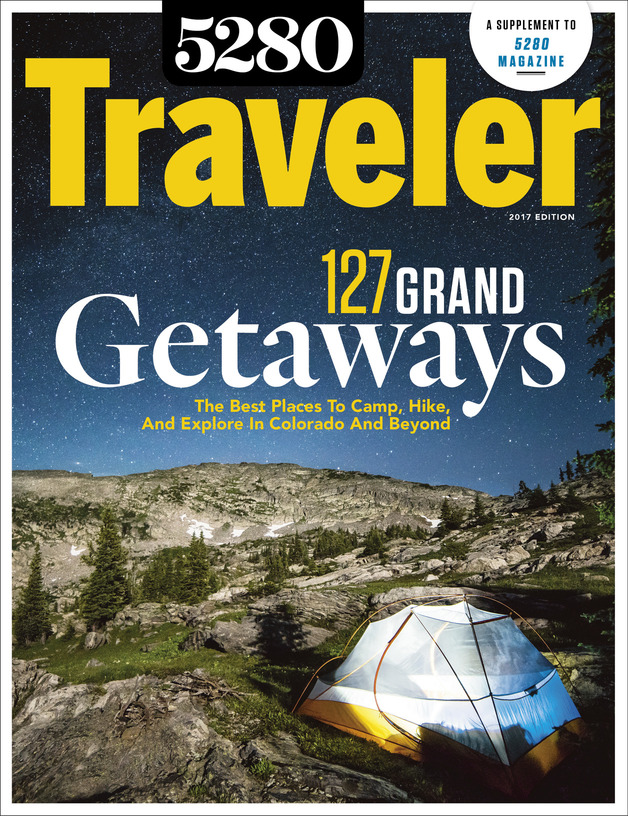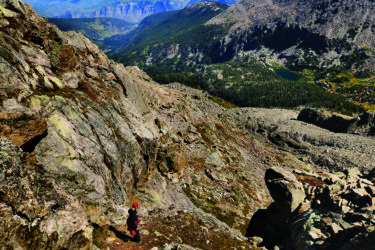The Local newsletter is your free, daily guide to life in Colorado. For locals, by locals.
Editor’s note: This article originally appeared in our June 2016 issue. This version was fact-checked and updated (where possible) with current information for the 2017 edition of 5280 Traveler.
It’s a cloudless May morning, and I’m gazing across the Colorado River, which looks deceptively tame from the Westwater boat launch. Beyond our rafts, the water flows swift and flat, with plenty of space to spread out between the tamarisk-covered banks. But Skull Rapid and the Room of Doom await downriver, and I know what my longtime adventure buddy, Jeni, would say about those monikers: They promise fright, not necessarily fun.
Her axiom holds that trails and outdoor destinations with romantic names like Emerald Falls or Bluebird Lake serve up easygoing good times, while signatures that reference death or blood or the devil signal danger—something Jeni (and plenty of other sensible folks) would rather avoid. But Jeni’s not on this adventure, and in fact, most of my companions on this two-day guided trip through Westwater Canyon fall into that other category of outdoor recreationists: adrenaline junkies. While our guides load up the three boats, my friends chatter excitedly about the Class IV white water we’ll tackle, giddy at the prospect of running some of the most notorious rapids in Utah’s canyon country. For them, the best trips include the addictive rush of epinephrine.
Then there’s me, the pleasure-seeking Bilbo Baggins of our adventure troupe. I’ve been known to rise to risky challenges when pressed, but I don’t relish death-defying stunts—even when I’m being shepherded by the expert oarsmen of Moab-based Sheri Griffith Expeditions, the outfitter leading us through the canyon. Despite the 80-degree temperatures in which we’re basking on this late-spring morning, I’m getting cold feet.
Westwater Canyon has a reputation for delivering huge thrills on a short, staggeringly beautiful 17-mile stretch of river. Boaters leave a vehicle at the Cisco takeout, then drive 30 miles east on I-70 to put in just west of the state line. There, the Colorado River courses through Utah’s striated red and black rock—some of which is so unyielding that even after millennia of being battered by powerful currents, it still pinches this mighty river into narrow chasms and turbulent Class III and Class IV rapids.
The most fearsome of those 11 named hazards is Skull, located where the Colorado makes a high-stakes left turn. Flub the entry and the current dumps your raft into the Room of Doom, a massive, rock-walled eddy that traps boats in a churning whirlpool. Prisoners have been known to bob around for hours while waiting for rescuers to make an arduous overland trek to hoist them out over the cliffs.
It’s not the first time I’ve been within rock-throwing distance of the canyon’s watery chaos. Westwater’s put-in is also the takeout point for the Colorado River’s Ruby- Horsethief segment. No permit is required to float those 25 toothless miles, so I’d logged many a trip through Ruby-Horsethief over the years, but I’d never had the nerve (nor the permit) to continue into Westwater, where the white water weeds out everyone but expert paddlers. That, of course, doesn’t mean I hadn’t always wanted to glimpse what was farther downriver. This trip, if I can summon the courage, is going to show me.
When the rafts are ready, I step aboard without too much hesitation. I’m excited for sunshine and sandstone—and for riverside camping. Westwater can be floated in a day, but we’ve opted to make it an overnight and savor the solitude. And because our first few river miles are as flat and snoozy as Ruby-Horsethief, I stop fretting about the rapids awaiting us on day two. Instead, I simply relax: After all, I’ve got sun on my shoulders and a cold one in my hand (we filled the rafts’ coolers with canned beer), and soon our guides—José, Tabitha, and Jarvis—circulate platters of sliced bananas, grapes, and oranges. It’s enough to make this hobbit very happy.
In fact, there’s little more to do on day one than eat and drink. After seven miles and a scant couple of hours on the water, we land above the Little Dolores River, a tributary of the Colorado, and set up camp. While the guides assemble the “kitchen,” the rest of us hike up the Little Dolores to a small waterfall cascading down an algae-covered cliff. The pool beneath it proves too shallow for swimming, so we strike out in search of the petroglyph José had mentioned we might find on the bluffs above camp. The etched eagle we discover turns out to be modern art rather than an artifact left by the Ancestral Puebloans, but it’s pretty cool nonetheless.
Feeling satisfied with our explorations, we wash off the sweat from our late-afternoon hike with a swim in the Colorado and then gather for happy hour margaritas. Dinner is steak and potatoes followed by Dutch oven chocolate cake. The sugar and tequila keep us laughing around the campfire till well after dark, but when we finally creep away to our tents, I can’t bring myself to go inside. Instead I yank out my sleeping bag and unfurl it beneath the night’s starry marquee, whispering with my girlfriends until our pauses stretch into silence filled only by the river’s distant roar.

Shuffling to the kitchen to collect my morning cup of coffee, I sense a different vibe among the group. A rafting rite of passage is eminent: Jarvis is reading a river guidebook, cramming for today’s test. José and Tabitha are methodically packing their boats, distributing the loads for maximum stability. During our 20-minute safety talk, no one fidgets. We all want to know how to save ourselves should we get tossed into the froth.
Our rafts are the only ones we’ve seen on the river, which is running at 13,600 cubic feet per second. A grizzled guide with more than 30 years’ experience, José explains that flows under 10,000 and over 20,000 CFS are easier because the water either lacks force or submerges the scariest obstacles. But flows in the teens mix powerful water with big impediments. Clearly, only commercial trips such as ours are braving Westwater today, but we’re also making concessions to the river: Passengers won’t be paddling, as they would be in safer water. Instead, we’ll be riding on 18-foot oar boats that our guides will maneuver on their own. Tabitha is grinning with anticipation. “I like Skull,” she says, eyes sparkling. Reassured by her confidence, I climb aboard with her.
As soon as Tabitha pulls away from shore, she lines up the boat for the first two rapids, a Class II dubbed Wild Horse and a Class III called Little Dolores. Then she points out how the canyon’s walls are no longer made of golden sandstone but black Vishnu schist, polished to a high gloss by the river’s constant buffing. Wherever boaters find this intractable rock, she says, they can expect swirling water.
Entering the main gorge, Tabitha calls out the names of the Marble, Staircase, Big Hummer, and Surprise rapids as we approach them, but no matter how many washing-machine-like agitators we successfully ride, I can’t relax. Skull is up ahead.
As if on cue, Tabitha stands up to get a better view. Then she sits, grasps the oars, and lets Skull Rapid sweep us into its vortex. But instead of riding the safe-looking middle line, she steers us toward the menacing black wall. The ominous eddy known as Room of Doom is so close I feel like I’m already circulating in its inescapable currents.
I glance back, expecting to see Tabitha mirroring my alarm, but she’s enjoying the drama, so I train my eyes on the fast-approaching rock wall. The raft smacks into it, as if the rubber were high-fiving the granite, and we spin backward into the calm pool below. I realize then that Tabitha wasn’t settling for the easiest option: She’d chosen a high-percentage route—and then thrown in a few style points. Flooded with a strange mix of relief and admiration, I struggle to come up with a fitting quip, but I’m no action hero. I’m just riding with one.
Three more rapids bounce the boats, then six miles of flat water ferry us to the Cisco takeout, where our cars are parked. But as the canyon cliffs recede back to ho-hum tamarisk and the banks grow farther apart, we’re anything but bored. The electricity of our morning still crackles through us, and anytime someone raises a beer it becomes an excuse for a group toast—to us, to our guides, to the majesty of the Colorado River. As much as I love lazy Ruby-Horsethief, none of those trips ever felt like a mission accomplished. Westwater does, and I’m glad I chose to accept it.









